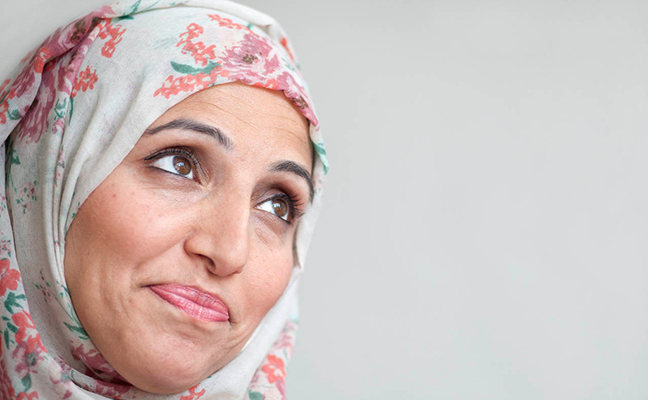We are pleased to be able to share an extract from the latest High Profiles interview with Salma Yaqoob. To read the fascinating interview in full (for free), visit the High Profiles website here.
Salma Yaqoob cut her teeth as an anti-war campaigner and for nine years led the Respect Party, which she co-founded in 2004. Over the years, she has been courted by the Conservatives, the Liberal Democrats, the Greens and Labour.
Huw Spanner found her at home in Birmingham on 21 July 2016.
You seem to have a strong sense of social justice. Did you get that from your parents?
I would credit them in the sense that when we were watching the news – we had a strict upbringing and were not allowed to watch films and so on, in order to protect us – my dad would be saying: Look at the people in the world that are suffering! I suppose the difference between us was that he saw himself as an immigrant, as a guest, and so he saw it as our place to stay quiet.
After ‘9/11’, when I decided to join the anti-war movement, he found that quite difficult. One part of him was: Look, the misunderstanding is so great now, and the fear and the hatred. If you start saying anything against the Government, we’ll be seen as traitors. And I do understand that sentiment.
So, where does the bolshiness in you come from? Is it just temperament, or can you trace it back to particular things in your childhood?
I think a bit of both. You know, you can do a lot of reading and think, ‘Oh, that’s interesting!’ but for me it comes down to just a few basic things. There’s a verse in the Qur’an – surah 4, verse 135 – which says: Stand up for justice even if it goes against yourself or your parents or your kin, rich or poor.
My mum always said: ‘You can’t be doing all this activism. What about your kids? You’re being a really bad mum!’ So, I have the guilt from that. But I’d say: Look, it doesn’t say ‘Stand up for justice when it’s convenient.’ It doesn’t say ‘Stand up for justice when your mortgage is paid off and you’re financially secure.’ It doesn’t say ‘Stand up for justice when your kids have grown up.’ We can all do the right thing when it’s easy, but the test comes when actually you might have to pay a personal price.
If your politics are shaped by Islam, is that more a matter of finding principles in the Qur’an or of following Muhammad’s example, or about having a relationship with God and responding to him?
It’s them all, up to a point, because they are all connected. For me, the most important thing is the relationship with God – and in that I have my tussles as well as the love and the awe. Every day, I try to be the best that I can be, very conscious that I have my weaknesses and my faults; and that’s a very private inner journey, inner struggle, trying to be brutally honest with myself and knowing that – well, believing that I am in the presence of God at all times and do I measure up to that?
Then, I believe that we have been given guidance as to, well, this is what good looks like – you know, being kind, being honest, all of those things – and so my politics is about: how does that translate into a society?
High Profiles
Photo credit: © Andrew Firth


